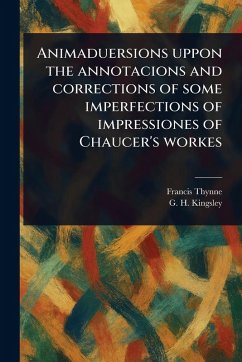Explore the intricacies of early Chaucer editions with Francis Thynne's "of some imperfections of impressiones of Chaucer's workes." This 1865 edition provides unique literary criticism focused on William Thynne's 16th-century printing of Chaucer, highlighting the printing errors present in these early versions. Delve into the challenges and complexities of Renaissance literature as Thynne examines the nuances of Chaucer's poetry and the difficulties in accurately reproducing his work. This volume offers valuable insights into medieval literature and the early printing process, making it a compelling resource for anyone interested in the history of literary criticism and the enduring legacy of Chaucer's poetic voice. A cornerstone for scholars and enthusiasts alike, this book sheds light on the meticulous work required to preserve and transmit literary masterpieces across the centuries. This work has been selected by scholars as being culturally important, and is part of the knowledge base of civilization as we know it. This work is in the public domain in the United States of America, and possibly other nations. Within the United States, you may freely copy and distribute this work, as no entity (individual or corporate) has a copyright on the body of the work. Scholars believe, and we concur, that this work is important enough to be preserved, reproduced, and made generally available to the public. We appreciate your support of the preservation process, and thank you for being an important part of keeping this knowledge alive and relevant.
Bitte wählen Sie Ihr Anliegen aus.
Rechnungen
Retourenschein anfordern
Bestellstatus
Storno









